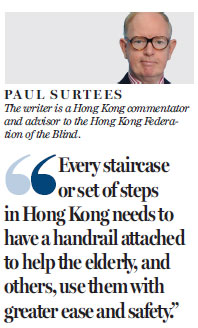Building infrastructure for an aging population in our city
Updated: 2016-03-07 08:28
By Paul Surtees(HK Edition)
|
|||||||||
Hong Kong's population is aging at an unprecedented rate. Over the next 20 years, it is anticipated that the proportion of our citizens aged 65 and above will double, meaning that by 2036 almost a third of Hong Kong's population will be of retirement age.
How many of these seniors will be able to afford to actually retire remains an open question, because so far pension provision here is for the most part woefully inadequate. The public debate rages on about what - if any - enhanced provision should be made for pensions for our senior citizens. In my view, the need for a universal livable pension in Hong Kong is manifest and present, and furthermore the vast government-held public reserves should be dipped into to fund it. But a community can look after its older citizens in many other additional ways, such as those proposed here.
For many of us, our health deteriorates as we age, with some suffering serious impairment. While Hong Kong's public hospitals are already struggling to provide the best healthcare to all those needing it, the provision of both primary and secondary healthcare will need to be greatly expanded to keep up with the demand. The Hospital Authority would do well to start planning to meet this inevitable sharp increase in demand on its resources - not just in its facilities, but especially in trained personnel. Taking into account the number of doctors and nurses who graduate annually from local institutions, and the attrition due to retirement and migration to the private sector, it is common knowledge that under-staffing of government hospitals is likely to get worse before it gets better, unless decisive action is taken now to facilitate the employment of foreign-trained doctors and nurses. Medical professional protectionism has no place in our society. This is because in the treatment of serious illnesses of fragile elderly patients, timely adequate medical intervention often means the difference between life and death.
Hong Kong's sparkling shopping malls, many parks, bus, ferry, and tram stops, light rail and MTR train platforms, town squares, and public and commercial buildings all currently provide too few benches or seats upon which our senior citizens can rest their weary legs. Most of them simply cannot stay on their feet over even mildly extended periods.
The low birthrates of our younger generations mean that there will not, in future, be enough children or grandchildren around to take care of their parents or grandparents. If family members cannot do this, then who will? In Singapore, a special category of well-trained domestic helpers recruited from overseas helps with the daily needs of its elderly citizens. Might not a similar scheme be introduced here?
High-traffic public space should be made more pedestrian-friendly (and thereby also more elderly-friendly) by strict enforcement against those shops which display their merchandise illegally on pavements.
Every staircase or set of steps in Hong Kong needs to have a handrail attached to help the elderly, and others, use them with greater ease and safety. This is a huge requirement which will take years to complete: All the more reason for starting on this task today!
The scandalous treatment of some physically and mentally fragile residents in homes for the elderly is directly traceable to a serious shortage of such facilities, while families of abused residents are unwilling to file complaints because of difficulties in gaining admission to such places. Thus, far greater provision of affordable elderly care residential homes and daycare centers needs to be made. This should be matched by stricter official supervision of such homes to ensure compliance in the operation of such facilities.
Proper bus travel etiquette ought to be more aggressively promoted and enforced. Examples are legion of younger, able-bodied passengers - and even children - inappropriately hogging the supposed "special needs" seats on public transport and being most reluctant to give them up, even when an elderly person is left standing nearby. More education on civic duties and better public manners should be introduced in schools, when young minds are more malleable, to rectify this disgraceful yet widespread problem.
As more and more senior citizens use Hong Kong's public transport, thanks to the concession fares they have been given to encourage them to travel more often the breadth and width of our city at minimal cost, a far greater proportion of designated seats should be set aside for them and for others with special needs. Even in those rare cases when every special seat on an MTR train or public bus is actually occupied by someone who really needs it, many other elderly citizens can still be seen left standing - because there are simply not yet enough of these special seats provided. Now would be a good time to start to gradually increase such provision.

(HK Edition 03/07/2016 page9)